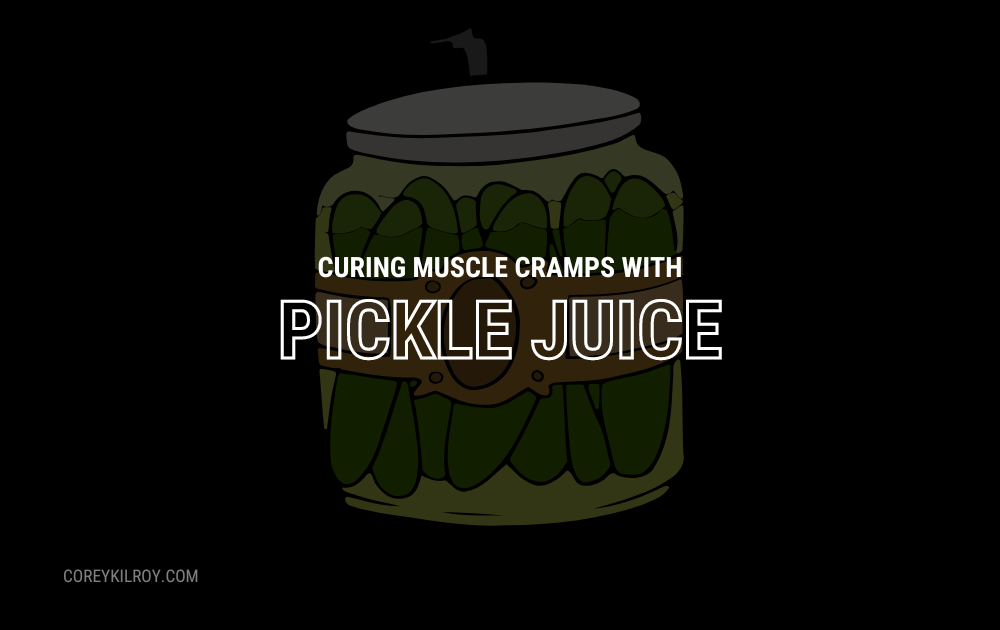Pickle Juice for Muscle Cramps?

I recently stumbled upon a concept that piqued my interest.
👉 Does pickle juice help with muscle cramps? 👈
The use of pickle juice for this purpose has increased in popularity in recent years, so here’s a little synopsis to see if it really works.
Muscle cramps are fairly common, especially with athletes who sweat a lot, and can be oh-so painful.
The use of pickle juice as a possible treatment for these cramps has gained popularity in recent years.
My girlfriend is even instructed to give her D1 football team shots of pickle juice to combat their muscle cramps at her Dietetic internship… so it must mean something, right?
But does it really work?
It’s known that many athletes swear by pickle juice, but on the other hand, there are many skeptics out there that write it off as a placebo.
With that being said, there’s just not much research out there to prove whether or not it’s true.
Because pickle juice is such a widely used remedy for cramps in the sports world, there’s been some research and studies investigating its effects…though not much.
Many – including myself – theorize that the sodium content in the pickle juice provides adequate electrolytes for the athlete and corresponds to the combat against dehydration.
But a study in 2014 seemed to debunk this…
After checking blood plasma levels of nine healthy men for signs of increased electrolytes following consumption of pickle juice after exercise, researchers found that electrolyte levels remained the same.
The same set of researchers also did a test on pickle juice for cramps earlier in 2010.
They found that it did work to shorten the cramp duration.
On average, it relieved cramps in about 1.5 minutes, and 45 percent faster than when nothing was taken after exercise.
The science behind why it may work
It’s currently unclear if and how pickle juice can help relieve cramps after exercise, but there are some researchers that think it's the vinegar content that may help trigger certain muscle reflexes.
While it hasn’t been proven yet, researchers suggest that pickle juice may help cramps by triggering muscular reflexes when the liquid contacts the back of the throat.
This reflex shuts down the misfiring of neurons in the muscle all over the body, and “turns off” the cramping feeling.
They believe that it’s specifically the vinegar content in pickle juice that does this.
I also truly believe that the sodium content in the juice contributes to replenishing the muscle with electrolytes, thus aiding with the dehydration causing the muscle cramps.
But in short, and yet again, still more research is needed to prove all of this.
How to use pickle juice for cramps
In studies where pickle juice was effective for muscular cramps, researchers used about 1 milliliter per kilogram of body weight.
So roughly speaking, for the average person, this is somewhere between 2 to 3 fluid ounces.
Measure out the pickle juice and drink it quickly.
Bring back those undergrad days and shoot it back like a shot…
You can use pickle juice from store-bought cucumber pickles or safely fermented homemade pickles.
Just make sure the natural vinegar acids and salts are present.
Also note: Because it’s thought that cramp relief comes from the vinegar specifically, avoid watering the juice down. Drink it straight up.

Things to know before using pickle juice
Because of the sodium content in the pickle juice, it should be noted that a little goes a long way.
If small amounts are taken — such as 2 to 3 fluid ounces occasionally — then there should be little to no health or dehydration concerns.
However, there are some side effects that you need to be aware of:
- High sodium: Too much salt can lead to water retention, swelling, and bloating.
- Raised blood pressure: Water retention from eating large amounts of salt can increase blood pressure.
- Indigestion: Drinking too much pickle juice can lead to gas, stomach pain, and diarrhea.
- Cramping: Some doctors worry that drinking pickle juice may cause electrolyte imbalances and worsen cramping. However, studies do not support this.
Bottom line: Drinking pickle juice is generally safe, though it may be a decent idea to discuss the risks with a doctor before trying it.
In the end…
The general consensus so far is that pickle juice can work for leg cramps after exercise.
Though there isn’t a whole lot of research on it, the studies so far are quite favorable.
If you’re truly hesitant, just give it a shot for yourself!
The worst that can happen is that you added a couple ounces of pickle juice to the ol' digestive system…
I mean plus the cramping too... but you know what I mean.
Be well and KEEP PLUGGIN, C.



